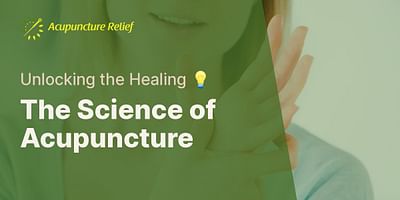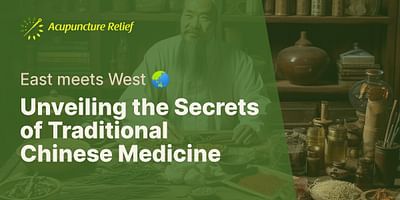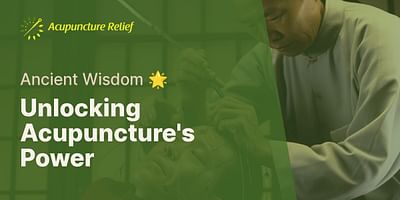Dr. Robert Kim is a medical doctor who specializes in pain management. He became interested in acupuncture as a complementary therapy to conventional medicine. Dr. Kim has a medical degree from Harvard Medical School and has completed an acupuncture certification program.
Yes, acupuncture can treat a wide range of ailments. Acupuncture is a key component of traditional Chinese medicine and has been used for over 2,000 years to treat various health conditions. However, it's important to understand that acupuncture is not a cure-all, but a complementary therapy that can help manage symptoms and improve overall well-being.
Understanding Acupuncture and its Effectiveness
Acupuncture works on the principle of stimulating specific points on the body, known as acupuncture points or meridians, to balance the flow of energy or 'Qi' in the body. This is believed to promote the body's self-healing process. The effectiveness of acupuncture in treating various ailments is supported by a growing body of scientific research.
Acupuncture Points and Their Corresponding Health Benefits
Acupuncture has been found to be effective in managing a variety of conditions including chronic pain, such as back pain, neck pain, osteoarthritis, and migraine; mental health disorders like anxiety and depression; digestive issues, such as nausea and vomiting; and respiratory conditions like asthma.
It's worth noting that while acupuncture can provide relief from symptoms, it should be used in conjunction with conventional treatments for optimal results.
Effectiveness of Acupuncture vs Conventional Treatments
Having discussed the potential benefits of acupuncture, let's compare its effectiveness with that of conventional treatments in managing various ailments.
| Ailments | Effectiveness of Acupuncture | Effectiveness of Conventional Treatments |
|---|---|---|
| Chronic Pain (e.g., Back Pain) | 👍 Highly Effective | 👍 Highly Effective |
| Mental Health Disorders (e.g., Anxiety, Depression) | 👍 Effective | 👍👍 Very Effective |
| Digestive Issues (e.g., Nausea, Vomiting) | 👍 Effective | 👍👍 Very Effective |
| Respiratory Conditions (e.g., Asthma) | 👌 Moderately Effective | 👍 Highly Effective |
As we can see, acupuncture can be a valuable complementary treatment for many conditions. Now, let's delve into how acupuncture works.
How Does Acupuncture Work?
During an acupuncture treatment, thin needles are inserted into specific points on the body. This is believed to stimulate the body's energy flow and promote healing. The exact mechanism of how acupuncture works is not fully understood, but research suggests that it may work by stimulating the nervous system, which in turn releases chemicals in the muscles, spinal cord, and brain. These chemicals can change the experience of pain and induce the release of other chemicals and hormones that influence the body's internal regulating system.
Understanding Acupuncture
Test your knowledge about the principles of acupuncture and how it works!
Learn more about 📝 Test Your Knowledge: Understanding Acupuncture or discover other Acupuncture Relief quizzes.
It's important to seek treatment from a licensed acupuncturist to ensure that the procedure is performed correctly and safely. The number of sessions required will depend on the individual and the nature of their ailment.
Is Acupuncture Safe?
When performed by a qualified practitioner, acupuncture is generally considered safe. Side effects are rare but can include soreness, minor bleeding, or bruising at the needle sites. It's important to discuss any concerns with your acupuncturist before starting treatment.
What has been your experience with acupuncture?
We'd love to hear about your personal journey with acupuncture. Whether you're a seasoned acupuncture patient or a curious newcomer, your insights can help others make informed decisions about this ancient practice.















